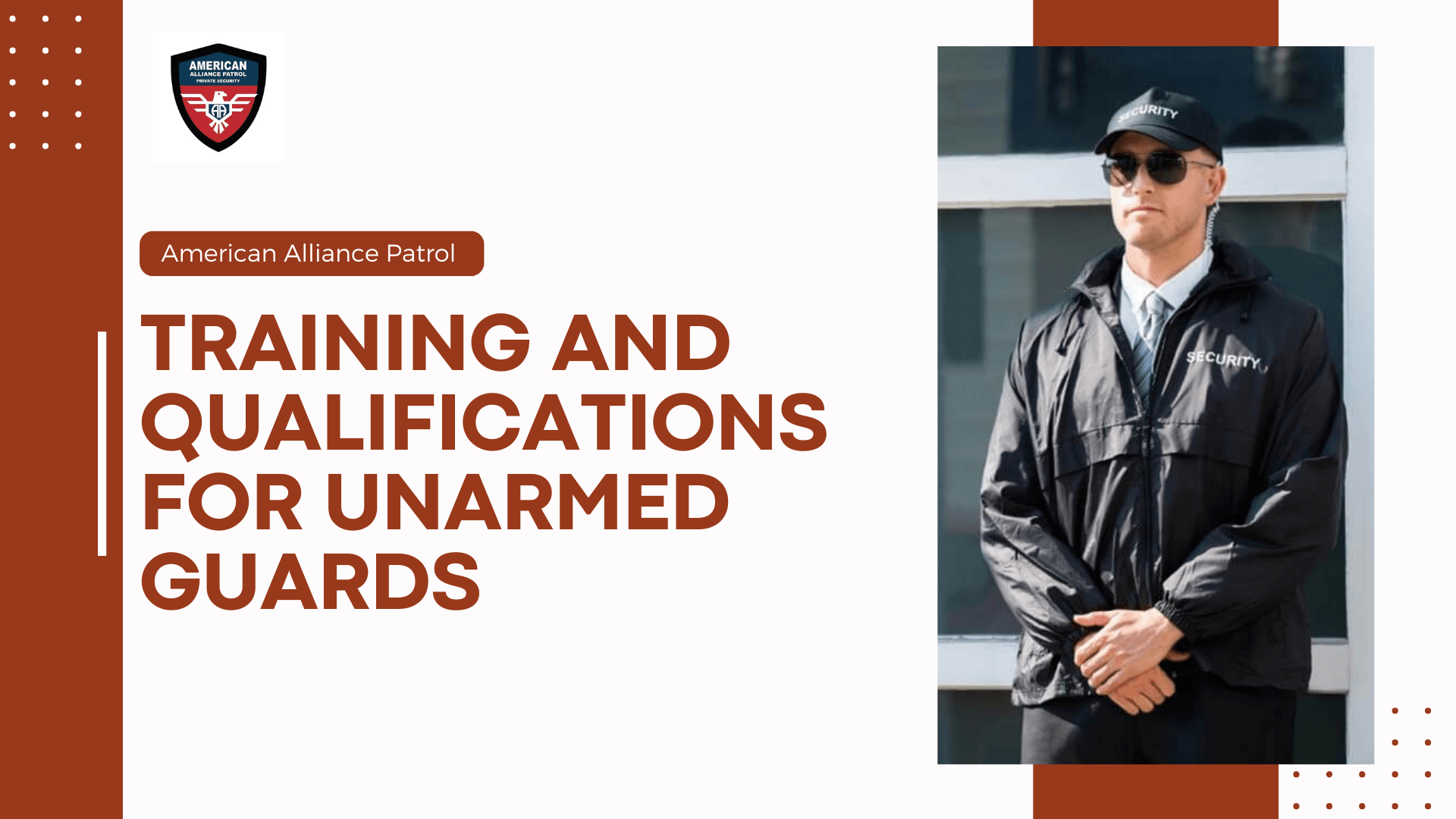Facebook Youtube Instagram Tiktok Pinterest 500px Free Quote What Are Unarmed Guards? Training and Qualifications for Unarmed Guards When people think about security, they often picture armed police officers or security guards carrying weapons. However, security goes beyond just a physical presence. Many other factors contribute to safety, including surveillance systems, cybersecurity, and emergency protocols. Together, these elements create a comprehensive security plan. Additionally, unarmed guards play a vital role in protecting people and property. You’ll find unarmed guards working in various settings, such as malls, office buildings, and event venues. They ensure operations run smoothly and that safety protocols are consistently followed. But how do you become an unarmed guard? What training and qualifications are necessary? This article will outline everything you need to know about the training and qualifications required for unarmed guards. Why Are Unarmed Guards Important? Unarmed guards are often the first line of defense in preventing crime or keeping an eye on suspicious activities. Although they don’t carry weapons, their range of skills makes them just as effective at maintaining safety. These skills often enable them to resolve situations peacefully, without needing to use force. They can spot potential threats, de-escalate tense situations, and act as a visible deterrent to crime. Many unarmed guards help with access control, monitor surveillance systems, and provide customer service to visitors or employees. Additionally, they often collaborate with other security personnel to ensure a smooth and efficient operation. What Is the Role of an Unarmed Guard? Unarmed guards have several key responsibilities, including: Surveillance and Monitoring: Observing surveillance cameras, checking security alarms, and ensuring the premises are safe. Patrols: Walking or driving around the property to spot potential hazards. Access Control: Monitoring entrances and ensuring only authorized individuals enter the premises. Customer Service: Helping visitors and answering questions. Emergency Response: Reacting quickly to situations like medical emergencies, fires, or suspicious activities. Understanding these duties is the first step in preparing for a career as an unarmed guard. So, what qualifications do you need? What Is the Role of an Unarmed Guard? Before you start thinking about training, it’s important to know the basic requirements for becoming an unarmed guard. These requirements can vary by state or location, but the following are generally needed: Age Requirements In most places, you must be at least 18 years old to become an unarmed guard. This age requirement exists because, as an adult, you are expected to take on responsibilities such as monitoring surveillance systems and making decisions during emergencies. Moreover, age requirements ensure that individuals have the maturity needed for these important tasks. In addition, being an adult is essential for making critical judgments in high-pressure situations. As a result, these regulations are in place to help ensure public safety. High School Diploma or Equivalent A high school diploma or equivalent is typically required. This ensures you have basic reading, writing, and math skills needed for tasks like filling out reports or understanding safety guidelines. Clean Criminal Record Most employers require a background check. This ensures you do not have any serious criminal convictions that could make you unsuitable for security work. Physical Fitness While unarmed guards do not need to be bodybuilders, physical fitness is important. You may need to walk around large areas, stand for long periods, or respond to emergencies quickly, and being physically fit can help you perform your duties effectively. Good Communication Skills Unarmed guards often interact with the public, employees, and law enforcement. Clear communication is essential for giving directions, providing information, or handling emergencies. Being able to de-escalate situations calmly is a vital part of the job. Training for Unarmed Guards Now that we’ve covered the basic requirements, let’s dive into the specific training and qualifications for unarmed guards. Basic Security Training All unarmed guards must undergo basic security training. This training usually covers: Observation and Reporting: Unarmed guards need to be trained in how to spot suspicious activities and report them properly. Emergency Procedures: Understanding how to respond during emergencies like fires, medical incidents, or break-ins. Customer Service: Learning how to interact with the public helpfully and professionally. Safety Protocols: How to secure an area, check for hazards, and ensure safety regulations are being followed. The duration of this training can vary but generally takes anywhere from a few days to several weeks, depending on the state and employer. First Aid and CPR Certification Many security companies require their unarmed guards to have a First Aid and CPR certification. This training, moreover, helps you respond effectively in case of medical emergencies, which could happen at any time on the job. For example, if someone collapses or gets injured, you can step in and assist until medical professionals arrive. In addition, the skills learned in this training enable you to act calmly and effectively, even under pressure. De-escalation Training One of the most important skills for an unarmed guard is the ability to de-escalate tense situations. Indeed, this skill is crucial because it helps prevent conflicts from escalating further. In addition, a guard’s ability to calm an aggressive individual can ensure the safety of everyone involved. Therefore, de-escalation becomes a key factor in maintaining order and preventing violence. Training for this involves learning how to calm down upset individuals, diffuse conflicts, and avoid situations that could turn violent. Legal and Ethical Training Unarmed guards also need to understand the legal and ethical aspects of security work. They are often responsible for enforcing rules, and it’s crucial to know what you are allowed to do and what is against the law. You must also understand privacy laws, particularly when it comes to surveillance and monitoring. Qualifications Needed for Unarmed Guards While training is essential, certain qualifications can help you stand out in the security industry. State Licenses Some states require unarmed guards to be licensed. To obtain a license, you may need to complete a state-approved training program and pass an exam. The requirements can vary, so it’s important to check with your state’s licensing

